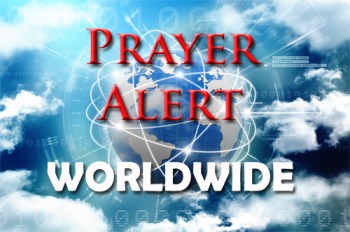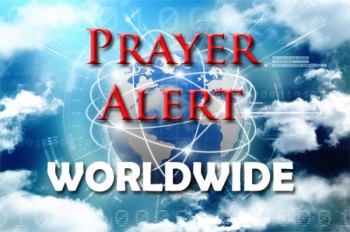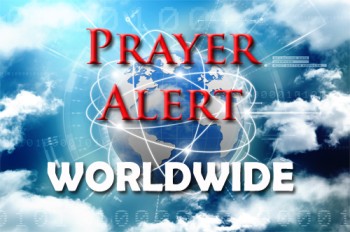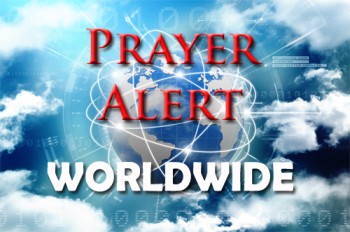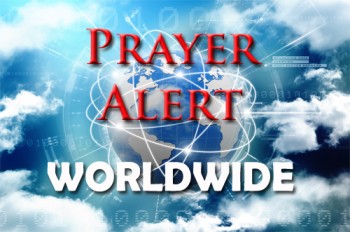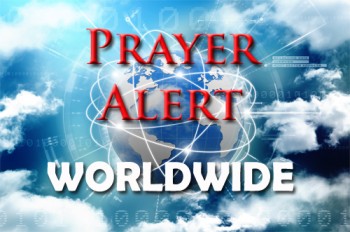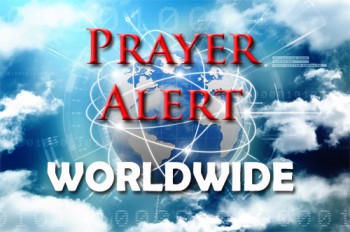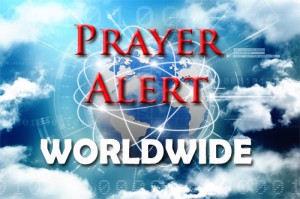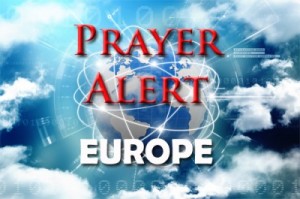Displaying items by tag: Kazakhstan
Kazakhstan: Christians need prayer and support
There are 4.9 million Christians in Kazakhstan in the mostly Muslim population. Since 2011, religious freedom has been restricted as government surveillance and control increases. When somebody becomes a Christian, they risk being locked up by their families, kept from other Christians, verbally and physically abused or cut off from family, community and financial support. The authorities monitor and raid meetings of Christian converts and may arrest and imprison their church leaders. The risk of being forcibly married to a Muslim remains an ongoing risk for women who become Christians|: in rural areas, they are sometimes kidnapped for this purpose. Christian men are pressured by the state, and in the army, a highly controlled environment. It is difficult for Christians to earn a living; authorities can demand bribes from Christian business owners, and some keep their faith a secret. Converts and church leaders particularly risk losing employment.
Kazakhstan: Points for prayer
Some say ‘to be a Kazakh is to be a Muslim’. Most Kazakhs follow a version of Islam influenced by shamans and indigenous practices. Other Muslim countries send Muslim missionaries to Kazakhstan, successfully converting even ethnic Russians to Islam. After the Soviet Union broke up, the number of mosques grew from 46 to 2,300 in 2020. The government keeps Islam moderate and is the only Central Asian state where Islam has no special status. Pray for freedom from historic spiritual bondages. Kazakhstan's cultural and religious diversity provides many opportunities for evangelising. A number of Kazakh Uzbeks and Uyghurs are turning to Christ and taking the gospel back to their own people. Christianity is still largely an urban phenomenon, but churches and missions (Baptists, Korean groups, Western agencies) are recruiting for village ministry. Pray that the Gospel might be shared in the listeners' language, in the many towns and villages of this sprawling land.
Kazakhstan: corruption
Kazakhstan’s ongoing civil unrest shows the need for meaningful progress against corruption. Last week there were countrywide protests over inequality, poverty and corruption, also calling for meaningful reforms. The wealth the country’s political elite have amassed through corruption has been a particular concern throughout the protests. Kazakhstan has made some progress in fighting corruption in recent years - in a 2019 study people and small businesses saw things improving on the ground - but serious concerns remain, such as the flawed anti-corruption framework, lack of responsiveness in policy-making, and state control of the media. Pray for the UN High Commissioner for Human Rights and other independent voices who are urging the government to resolve the ongoing unrest peacefully. Unless the violence stops immediately, the way out of the crisis is uncertain for the already struggling Kazakh society.
Kazakhstan: violent protests
Protests in Kazakhstan began on 2 January when the government removed a fuel price cap. The speed with which protests turned violent surprised everyone, hinting that they are not only about fuel. This is a traditionally stable Central Asian state, often described as authoritarian, with no electoral democracy - so people needed to take to the streets to be heard. Accusing foreign-trained ‘terrorist gangs’ of being behind the trouble, President Tokayev imposed a state of emergency that includes a curfew, a ban on mass gatherings, and Russian assistance to help ‘stabilise’ the country. Dozens of protesters were ‘eliminated’ after they stormed police buildings to steal weapons. By 6 January about 1,000 people had been injured; 400 are being treated in hospital and 62 are in intensive care. Twelve members of the security forces have been killed, and 353 injured.
Persistent picketing works
On 16 April Bitter Winter, a magazine on religious liberty and human rights, published the following: ‘His wife’s picket at the Chinese consulate in Almaty got so much attention that the CCP decided to give up, and set her husband free after 17 years of detention. Those who insist that picketing and protesting outside Chinese embassies and consulates is a waste of time were proved wrong in Kazakhstan.’ An amazing Kazakh woman from Xinjiang who had picketed the Chinese consulate in Almaty achieved the return of her husband Rakhizhan Zeinolla. He had been arrested without evidence when he went to Xinjiang from Kazakhstan, and kept in jail for 13 years. Then he was put into a camp, and later was under house arrest.
Kazakhstan: church buildings confiscated
The authorities in Kazakhstan's capital Nur-Sultan ordered the confiscation of the buildings of both Grace Presbyterian Church and Agape Pentecostal Church, which is building a place of worship on the same site. City authorities claim the land is needed for a new kindergarten. But officials refuse to explain why they cannot find another site for this, despite two possibly suitable other buildings being in the same Baikonur District of the capital. The move to confiscate both churches' property was initiated by the Construction and Residential Policy Department. It is unclear if corruption is a factor in the confiscation decision. Local media reported on 17 July that an unnamed former head of the Department is being investigated over the alleged embezzlement of 200 million Tenge (£363,733.80).
Silk Road prayer
The ancient Silk Road connected east and southeast Asia with Iran, the Arabian Peninsula, East Africa, and Southern Europe. Recently, after Central Asian pastors and leaders fasted and prayed for three days, a vision to raise up strong, unified, consistent prayer for this region of the world was ignited. With Central Asian Consultation, they are launching ‘Silk Road Prayer’, sending out regular prayer updates with specific information on how to pray for current needs in the region, and using social media to spread information for focused prayer. Intercessors everywhere are invited to join them in this effort to see God move in a new and unprecedented way along the ancient Silk Road. May believers and churches facing persecution across the region have His great strength to stand strong. Current needs are for churches in Uzbekistan and Turkmenistan to have registration to meet freely without persecution and a Kazakh church to have justice in a court case.
Kazakhstan: officials harass churches
Officials are harassing founders of religious communities, possibly trying to block applications to exist. In May police began harassing Oskemen's New Life Protestant Church as it sought re-registration after changing its name. Officers visited parishioners late at night, threatening one woman in her late 70s. People who give their names as founders of religious organisations applying for legal status continue to face harassment and intrusive questioning. Against international law, Kazakhstan bans all exercise of freedom of religion and belief without state permission. The UN Human Rights Committee states, ‘No one can be compelled to reveal his thoughts or adherence to a religion or belief.’ A church member said, ‘At present the founders do not think that their rights are being protected by the law or its representatives. We are being subjected to pressure, which cannot help but arouse concern about the right to freedom of conscience in Kazakhstan.’
Kazakhstan: state demands personal data
In another invasion into Christian freedom of religion, a Kazakh regional religious affairs department has demanded the personal data of everyone under 18 who attends Christian meetings for worship. It was not sent to Muslims. The department instructed locally-registered Christian communities to submit by 10 April full names, ages, place of study and personal state-assigned numbers of anyone under the age of 18 who met for Christian worship. The information was needed for ‘monitoring’. Darkhan Kalatayev is the new religion and civil society minister. Under him religious leaders risk prosecution if people under 18 attend worship against the wishes a parent or guardian. Prosecutions have been brought even in cases where neither parent has told a religious leader of their objections to such a person attending a meeting.
Kazakhstan: church prosecutions
All exercise of the right to freedom of religion or belief without state permission is banned in Kazakhstan, in defiance of the country's international human rights commitments. There is a growing trend of banning religious communities on various grounds. For example, on 16 March a court in South Kazakhstan fined and banned for a month a Protestant church for having three not five fire detectors in a property used only for storage. The fire inspector refused to explain why the order to install the extra fire detectors was not put in writing, or why the church was punished despite having installed those extra detectors within the specified one month. Also, at the same church, police arrested a woman for ‘missionary activity’ after she helped someone download a Bible onto her phone. Religious communities face raids and fines as parliament's lower house prepares the final text of a wide-ranging set of amendments to make the exercise of religion or belief more difficult. See also https://www.crisisgroup.org/europe-central-asia/central-asia/kyrgyzstan/kyrgyzstan-state-fragility-and-radicalisation
